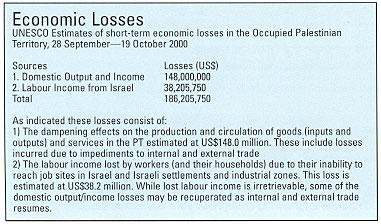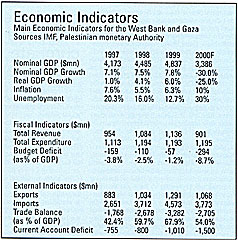|
Al Habtoor Information & Research Department
Since the beginning of the Al Asqa Intifada travel between different areas inside the Palestinian Territory (PT) has been severely hindered by roadblocks, checkpoints set up by the Israeli authorities and confrontations between Palestinians and Israeli solders. The main economic impact of these restrictions to mobility has been to curtail productive activities and disrupt the internal circulation of goods. The short-term losses of these restrictions are difficult to measure. They have reduced income of workers, farmers and business people who cannot reach their places of employment. They have reduced output and revenues for commercial and business enterprises who are unable to obtain inputs and/or access to their markets. Moreover, the uncertain security situation has reduced tourist-generated income. As the crisis persists, the extent of these types of losses became more pronounced. An approximate measure of the internal effects of these restrictions can be derived from estimates of the Gross Domestic Product, the value of goods and services produced in the Palestinian economy. The value of the GDP was expected to reach about US$5,000 million this year. The average work year in the Palestinian Territory is about 312 days. This results in an estimated average GDP of about US$16 million for each normal working day. The United Nations Educational Scientific and cultural organisation (UNESCO) estimates recent events have resulted in a 50 per cent reduction in normal economic activity in the Palestinian Territories. The losses are estimated at about 8 million dollars for each normal working day during the current crisis. In addition, exports from Gaza have been effectively blocked since the closing of the border at the beginning of the Rosh Ha Shana holiday (30 September-1 October). Exports from the West Bank have also been severely constrained during this period. Total registered Palestinian non-agricultural exports to Israel (the main market for Palestinian exporters) averaged about US$45.1 million per month during the first half of 2000. Assuming that these sales were distributed evenly throughout the working year, this implies a daily loss of about US$1.9 million in exports. Border closures and mobility restrictions have negatively affected Imports from Israel. Commercial crossings in Gaza have been closed since Saturday, 30 September resulting in a complete halt to imported goods. Trade between Israel and the West Bank has been severely restricted as well. Registered non-agricultural imports from Israel averaged US$135.9 million per month in the first half of 2000 or about US$5.9 million for each working day. Furthermore, direct Palestinian imports from abroad averaged about US$3.1 million per day in the first half of the year. External trade is a vital component of the Palestinian economy and has important effects on the size of its GDP. Exports contribute to domestic production and income-generation while many imported goods are used as inputs in domestic production. Likewise, the inability to export dampens domestic production while a lack of imported raw materials and other inputs creates production stoppages for those businesses and farmers who rely on Israeli or foreign-produced inputs. There has also been physical destruction of private and public assets such as buildings, orchards and vehicles by the Israelis. The material losses have been caused by Israel’s use of heavy weapons, including rocket fire, against numerous buildings and vehicles in the areas administered by the Palestinian Authority. They have destroyed fruit orchards near flash points in the Palestinian Territories and Israeli settlers have destroyed Palestinian private property such as the numerous trucks used to transport goods to and from Gaza which were located in car parks under Israeli control. While the value of such losses is difficult to calculate, it is almost certainly in the millions of US Dollars.
There have also been losses in the public sector in the form of lost customs and VAT revenues. These, however, are difficult to quantify. Most of the losses in revenues related to external trade Moreover, some PA agencies have been closed, as many employees have been unable to reach their jobs due to internal closures imposed by the Israeli authorities. This has meant reduced public services and disruptions in development programmes and projects, many of which are supported by international donors and funds. Likewise, the crisis has resulted in a near halt to infrastructure development projects, most of which are donor financed, due to the lack of security, the evacuation of project personnel and to the lack of some materials. One immediate effect of the comprehensive and internal border closures imposed on the Palestinian Territories is that some 125,000 workers formerly employed in Israel are now unemployed. This has raised the core unemployment rate from about 11 per cent in the first half of 2000 to over 30 per cent. If this situation persists, the decline in household incomes, estimated at US$105 million a month, would reduce domestic purchases of goods and services and thereby further lower income. Rates of poverty will increase, requiring the Palestinian Authority to raise spending on social assistance at a time when its revenue base is being eroded. This would adversely affect fiscal conditions. Another indirect cost of the strife is the increased perception of political risk on the part of domestic and foreign investors, both current and potential. The PT (and Israel) will be seen as a riskier place to invest for the long term. This can threaten the short-term and long-term growth of the Palestinian economy and reduce the rate of income and employment growth. The longer the Current Crisis goes on the greater will be the cost to the economy of the Palestinian Territories as domestic and foreign investment disappears in this era of uncertainty. It will threaten short and long-term growth of the territories that are being crippled by Israelis chokehold on nearly all economic activity in the Territories and will cause untold hardship to all that live there. |
 The current crisis in Palestine has, in addition to causing the death or injury of thousands of Palestinians, and several Israelis, placed serious restrictions on people’s freedom of movement between the West Bank and Gaza, the Occupied Palestinian Territory, Israel and the rest of the world. Furthermore Israel has placed obstacles to mobility between cities, towns and villages within both the West Bank and Gaza. The imposition of strict comprehensive internal border closures by the Israeli authorities (including the placing of physical barriers between Palestinian villages and cities), has interrupted work, constrained trade and caused sever shortages in the Palestinian Territory. This has produced significant losses for the Palestinian economy.
The current crisis in Palestine has, in addition to causing the death or injury of thousands of Palestinians, and several Israelis, placed serious restrictions on people’s freedom of movement between the West Bank and Gaza, the Occupied Palestinian Territory, Israel and the rest of the world. Furthermore Israel has placed obstacles to mobility between cities, towns and villages within both the West Bank and Gaza. The imposition of strict comprehensive internal border closures by the Israeli authorities (including the placing of physical barriers between Palestinian villages and cities), has interrupted work, constrained trade and caused sever shortages in the Palestinian Territory. This has produced significant losses for the Palestinian economy. In addition to internal losses, the border closures have effectively halted the outward flow of the Palestinian work force. In the first half of 2000, an average of about 125,000 Palestinians were employed in Israel, Israeli settlements and industrial zones on a daily basis. The average worker was earning a daily wage of about US$27.50. As a group, these workers were earning approximately US$3.4 million each day.
In addition to internal losses, the border closures have effectively halted the outward flow of the Palestinian work force. In the first half of 2000, an average of about 125,000 Palestinians were employed in Israel, Israeli settlements and industrial zones on a daily basis. The average worker was earning a daily wage of about US$27.50. As a group, these workers were earning approximately US$3.4 million each day. UNESCO estimates that economic losses Excluding material damage to physical assets, to the Palestinian economy were US$186.2 million for the 22-day period 28 September—19 October. This loss exceeds the value of donor disbursements to the Palestinian Authority during the first half of the year, which were US$183 million the average daily loss is estimated at US$8.5 million.
UNESCO estimates that economic losses Excluding material damage to physical assets, to the Palestinian economy were US$186.2 million for the 22-day period 28 September—19 October. This loss exceeds the value of donor disbursements to the Palestinian Authority during the first half of the year, which were US$183 million the average daily loss is estimated at US$8.5 million.